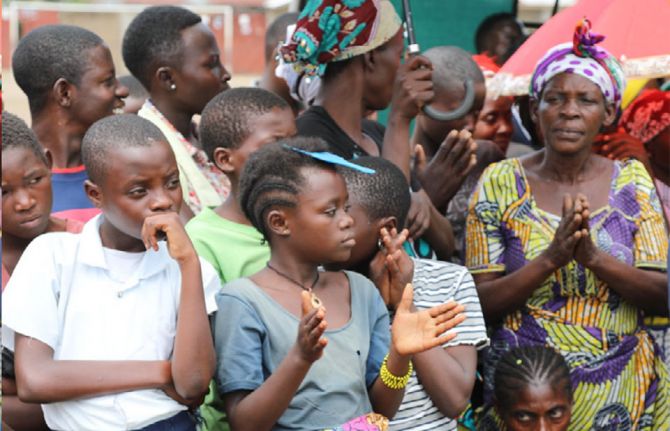



Feature Story
Working to end gender-based violence in fragile settings
28 August 2024
28 August 2024 28 August 2024Across the world, spikes in instability, displacement, and conflict are exacerbating people’s vulnerability to gender-based violence and to HIV.
“Gender-based violence is an egregious human rights violation. It is also a driver of the AIDS pandemic, especially in fragile states. Tackling gender-based violence is essential to uphold the right to health and life for everyone,” says UNAIDS Executive Director, Winnie Byanyima.
Efforts to prevent and to respond to HIV and gender-based violence in fragile settings remain partial, isolated, and unstable despite normative commitments made at the global level.
Fragility is described by the Organisation for Economic Co-operation and Development as “…the combination of exposure to risk and insufficient coping capacities of the state, system, and/or communities to manage, absorb or mitigate those risks.”
The new report, The Missing Link: Rethinking and reprioritizing HIV and gender-based violence in fragile settings, reveals the results of a study on the linkages between HIV and gender-based violence in fragile settings. This issue is explored through the lens of peace support operations. Work was partially funded through the generous contribution of the Grand Duchy of Luxembourg to UNAIDS.
The study examines the mandates and objectives of peace support operations, revealing that HIV and gender-based violence remain deprioritized, with responses of peace support operations often disconnected. Several challenges in translating agreed-upon principles into actionable results are identified and recommendations are offered to address these barriers.
“This report provides a crucial guide to support strategic decision-making in HIV and GBV advocacy in peace support operations and will be a vital tool for addressing these urgent challenges effectively,” says Sihaka Tsemo, Director, UNAIDS Liaison Office to the African Union & UNECA.
The report provides guidance to duty bearers across the development, peace and security and humanitarian arenas.
In the Democratic Republic of the Congo, for instance, the UN peacekeeping mission, MONUSCO, is in an active process of withdrawal and transition. UNAIDS Country Director, Susan Kasedde, reflects on the vital role of the UN’s Joint Programme on HIV and AIDS in addressing the multifaceted interlinkages between HIV and gender-based violence in fragile settings:
“The Joint Programme brings together invaluable expertise for a holistic response and plays a crucial role in strengthening state capacity to lead and deliver, through supporting strengthened systems for accountability and governance, and through facilitating broad partnerships, including with communities, to enable transformative and sustainable changes and take to scale effective models for integrated delivery of HIV interventions on the ground.”
In Mali, the decade-old Multidimensional Integrated Stabilization Mission has recently completed its withdrawal. UNAIDS Country Director, Marc Saba, explains the role of the United Nations Gender Thematic Group in supporting internally displaced persons in localities affected by insecurity and the humanitarian crisis.
“In the past 8 months the UN Country Team in Mali, under the leadership of UN Women, has provided capacity building, food support and funds to carry out income-generating activities to over 1000 women, young girls and men in vulnerable situations. In addition, the UN Joint Team on AIDS plans to launch a study on HIV and gender in humanitarian contexts, with the goal of collecting and analysing data to better understand these issues within the humanitarian response.”
The Missing Link report underscores the critical need for well-coordinated, multisectoral approaches to address HIV and gender-based violence effectively in fragile settings. It contributes to a wider conversation which requires further research, collaboration and multisectoral engagement. It provides recommendations for building a more holistic, human-rights based and gender transformative approach to addressing and eliminating gender-based violence in all its forms in fragile settings.
“To end gender-based violence and to end AIDS, depends on uniting efforts across multiple sectors, on survivor and community-centred approaches, and on sustained investment.” says Winnie Byanyima, UNAIDS Executive Director.
The issues raised in the report will be discussed in a stakeholder roundtable scheduled for 10 September 2024.
The webinar will be via Zoom on 10 September 2024 at 13:30-15:00, Geneva, Switzerland time. It will be 11:30 in Dakar, Senegal, and 14:30 in Addis Ababa, Ethiopia. Simultaneous interpretation into English and French will be provided.
Kindly click on the link below to register and participate, and do not hesitate to share information about the webinar with your networks.



